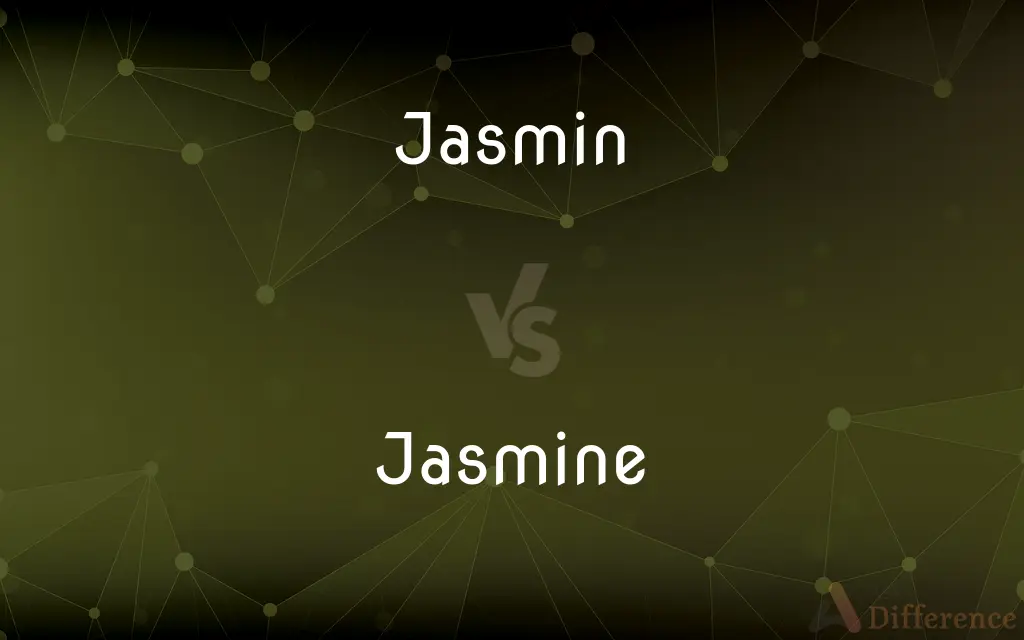Jasmin vs. Jasmine — What's the Difference?
By Tayyaba Rehman & Maham Liaqat — Updated on March 17, 2024
Jasmin typically refers to a person's name, while Jasmine is a fragrant flower from the olive family.

Difference Between Jasmin and Jasmine
Table of Contents
ADVERTISEMENT
Key Differences
Jasmin, often used as a given name, can be associated with various cultural and personal identities, embodying characteristics and meanings attributed by different societies. Jasmine, on the other hand, is a plant known for its aromatic flowers, widely appreciated in perfumery, teas, and gardens for its sweet fragrance.
While Jasmin's usage is primarily in naming, highlighting its role in human identity and cultural symbolism, Jasmine plays a significant role in nature and human activities, contributing to ecosystems, culinary arts, and the fragrance industry.
Jasmin, as a name, can vary in popularity and significance across regions and times, reflecting trends, cultural influences, and familial choices. Conversely, Jasmine, as a botanical entity, holds a relatively stable place in horticulture, traditional medicine, and aromatherapy, valued for its beauty and scent.
The spelling variations between Jasmin and Jasmine also reflect their different contexts of use; Jasmin without the "e" is more commonly found in personal names across various cultures, whereas Jasmine with the "e" is universally recognized as the plant. This distinction helps clarify the nature of the reference in conversation or writing.
In the realm of etymology, Jasmin's roots can be traced back to Persian and Arabic origins, denoting "gift from God," a meaning that adds a layer of cultural and spiritual depth to the name. Jasmine's etymology, while also deriving from Persian, emphasizes the plant's historical and geographical journey as it spread across continents, becoming embedded in numerous cultural traditions and languages.
ADVERTISEMENT
Comparison Chart
Primary Use
Given name
Flowering plant
Significance
Personal identity, cultural symbolism
Fragrance, culinary and decorative uses
Variability
Popularity and usage vary by culture
Consistent presence in horticulture
Context
Human naming conventions
Nature, perfumery, culinary arts
Etymology
Persian, Arabic origins, meaning "gift from God"
Persian origins, emphasizes the plant's spread
Compare with Definitions
Jasmin
Personal Name.
Jasmin decided to study botany in college.
Jasmine
Perfumery Base.
Jasmine oil is a key ingredient in many perfumes.
Jasmin
Variably Spelled.
Jasmin can be spelled with or without the final e, depending on cultural preferences.
Jasmine
Culinary Use.
Jasmine flowers are sometimes used to flavor dishes and desserts.
Jasmin
Symbolic Meaning.
Jasmin, meaning gift from God, is a cherished name in our family.
Jasmine
Tea Ingredient.
Jasmine tea is known for its calming properties.
Jasmin
Given Name Popularity.
Jasmin has become increasingly popular in recent years.
Jasmine
Fragrant Flower.
The garden was filled with the sweet scent of jasmine.
Jasmin
Cultural Identity Marker.
In our culture, Jasmin is a name that signifies beauty and grace.
Jasmine
Ornamental Plant.
We planted jasmine along the fence for its beauty and aroma.
Jasmin
Archaic form of jasmine
Jasmine
Jasmine (taxonomic name Jasminum YASS-min-əm) is a genus of shrubs and vines in the olive family (Oleaceae). It contains around 200 species native to tropical and warm temperate regions of Eurasia and Oceania.
Jasmine
An Old World shrub or climbing plant which is popular as an ornamental and bears fragrant white, pink, or yellow flowers.
Jasmine
Any of several vines or shrubs of the genus Jasminum, native chiefly to Asia and having usually compound leaves and white or yellow flowers. Some of the fragrant species are used in making perfume.
Jasmine
The perfume obtained from these plants.
Jasmine
See yellow jessamine.
Jasmine
Any of several plants or shrubs having fragrant flowers.
Jasmine
A light to brilliant yellow.
Jasmine
Any of several plants, of the genus Jasminum, mostly native to Asia, having fragrant white or yellow flowers.
Jasmine
The perfume obtained from these plants.
Jasmine
Any of several not closely related plants having a similar perfume.
Jasmine
A yellow colour.
Jasmine
A shrubby plant of the genus Jasminum, bearing flowers of a peculiarly fragrant odor. The Jasminum officinale, common in the south of Europe, bears white flowers. The Arabian jasmine is Jasminum Sambac, and, with Jasminum angustifolia, comes from the East Indies. The yellow false jasmine in the Gelseminum sempervirens (see Gelsemium). Several other plants are called jasmine in the West Indies, as species of Calotropis and Faramea.
Jasmine
Any of several shrubs and vines of the genus Jasminum chiefly native to Asia
Common Curiosities
Why does Jasmin sometimes lack the "e" at the end?
The spelling of Jasmin without an "e" is more commonly used for personal names, while the "e" at the end is typical for the plant's name, helping to distinguish between the two.
How do Jasmin and Jasmine differ in usage?
Jasmin is used as a personal name, reflecting individual and cultural identities, whereas Jasmine is used to refer to a specific plant known for its fragrance and aesthetic appeal.
Can Jasmin be related to Jasmine?
Yes, the name Jasmin is sometimes chosen because of the positive associations with the jasmine flower, such as beauty and fragrance.
What is Jasmine?
Jasmine refers to a fragrant flowering plant from the olive family, widely used in perfumery, culinary arts, and as an ornamental plant.
Does the popularity of the name Jasmin change over time?
Yes, like all names, the popularity of Jasmin can fluctuate over time and across regions, influenced by cultural trends and personal preferences.
What is Jasmin?
Jasmin is primarily a given name, often chosen for its beauty and the meanings attributed to it across different cultures.
Is Jasmine only used for its scent?
While jasmine is famous for its fragrance, it also has culinary uses, serves as a tea ingredient, and plays a role in traditional medicine and aromatherapy.
What cultural significance does Jasmine have?
Jasmine holds various cultural significances, symbolizing love, beauty, and purity in many traditions, and is often used in ceremonial contexts.
Are there different types of Jasmine plants?
Yes, there are several species of jasmine, each with unique characteristics, flower forms, and scents, adapted to different climates and uses.
How do you care for a Jasmine plant?
Jasmine plants typically require well-drained soil, adequate sunlight, and regular watering to thrive and produce their fragrant flowers.
What makes Jasmine a popular choice in perfumery?
Jasmine's intense, sweet fragrance makes it a sought-after ingredient in perfumery, capable of adding depth and richness to scents.
Can Jasmin as a name influence a person's identity?
Names like Jasmin can carry personal and cultural meanings, potentially influencing how individuals see themselves and are perceived by others.
How does the meaning of Jasmin as "gift from God" reflect on its cultural significance?
The meaning of Jasmin adds a layer of spiritual and emotional depth to the name, enhancing its significance in cultures that value names with profound meanings.
Is Jasmine tea made from the Jasmine flower?
Yes, Jasmine tea is made by infusing tea leaves with the scent of jasmine flowers, creating a fragrant and soothing beverage.
Can Jasmine be grown indoors?
Jasmine can be grown indoors with proper care, including sufficient light, water, and temperature control, allowing its fragrance to be enjoyed inside.
Share Your Discovery

Previous Comparison
Mantel vs. Mantle
Next Comparison
Caretaker vs. CaregiverAuthor Spotlight
Written by
Tayyaba RehmanTayyaba Rehman is a distinguished writer, currently serving as a primary contributor to askdifference.com. As a researcher in semantics and etymology, Tayyaba's passion for the complexity of languages and their distinctions has found a perfect home on the platform. Tayyaba delves into the intricacies of language, distinguishing between commonly confused words and phrases, thereby providing clarity for readers worldwide.
Co-written by
Maham Liaqat













































